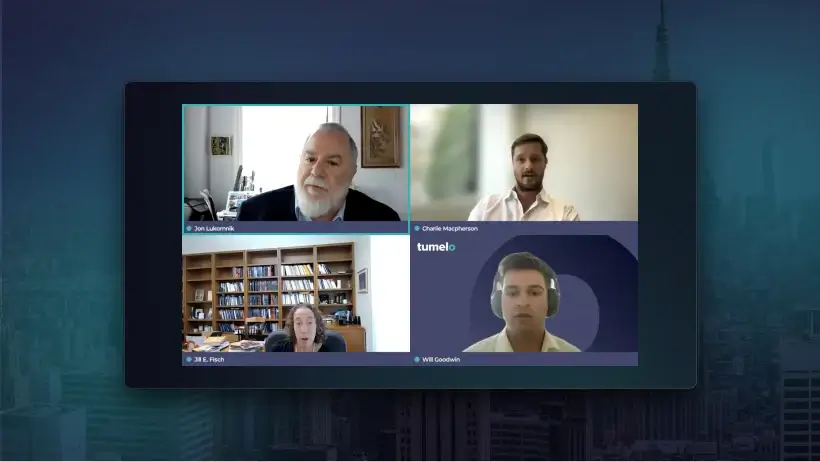Webinar: Experts discuss latest developments in pass-through voting

On July 11th 2023, Tumelo brought together four industry experts for a webinar on "The latest on pass-through voting: Q&A with the experts". Exclusive insights were shared by the panelists as they discussed pass-through voting implementation, stewardship implications, and answered questions from attendees.
The webinar was moderated by Jon Lukomnik, Adjunct Professor of International and Public Affairs at Columbia University, and once described by Forbes as a "pioneer of modern corporate governance". He was joined by panelists Will Goodwin, Co-founder of Tumelo, Jill E. Fisch, Saul A. Fox Distinguished Professor of Business Law at the University of Pennsylvania Law School, and Charlie Macpherson, Managing Director of ETFs at investing platform CIRCA5000.
Continue reading for our key highlights from the webinar.
Voting is about choice
As the co-founder of Tumelo, a company that offers pass-through voting and expression of wish solutions, Will said that he believes solutions like pass-through voting are about creating greater choice for investors.
"Pass-through voting specifically is about allowing investors in pooled funds to vote their proxies in proportion to the amount of AUM they actually have in the fund,"
he explained.
This includes choosing to delegate that voting to the fund manager or a third-party proxy advisor, depending on what the investor believes is best. Different investors may have different ways of approaching voting delegation, with Will specifically drawing a distinction between institutional investors such as pension and endowment funds, and retail investors.
Not all asset owners are the same
Jill Fisch is an established academic in the business law space, having published more than 90 scholarly articles throughout her career. When asked about her next area of research, she highlighted the possible need to evaluate — and cater to — different asset owners individually. Jill drew particular attention to US public pension funds who recently have been embroiled in highly public political debates around ESG investing.
Expanding on the uniqueness of public pension funds, Jill says:
"They're kind of distinctive because at the end of the day, they're political actors in a way BlackRock is not[...] Ultimately the decisions they make about investing will affect not just their beneficiaries but taxpayers generally."
This raises the question of whether it is ever legitimate for fiduciaries to incorporate political values when managing beneficiaries' assets — an idea that echoes her recent paper with Jeff Schwartz, which argued that asset managers have a fiduciary duty to uncover beneficiaries' preferences before voting.
How will pass-through voting affect asset managers' stewardship?

The above question elicited enthusiastic responses from all three panelists, each with a different opinion. For Charlie, when asset managers offer pass-through voting to their clients, the manager's stewardship is only enriched.
"Passing through the vote is not the end of the conversation," he explains. As an asset manager, he engages CIRCA5000's customers when it comes to voting and incorporates those opinions into the fund's stewardship efforts. "If you can go to engage with a company's leadership team and say: not only do I feel this on behalf of the fund, but the end investors that I'm passing the vote on to also feel the same way, then I think you have a stronger position."
He adds that it makes it easier for the asset manager if the fund's mandate is clear, referring to CIRCA5000's recently-launched range of ETFs, which are based on themes such as Green Energy & Technology as well as Clean Water & Waste.
Conclusion
While the panelists dove deep into the questions frequently asked about pass-through voting, this article captures only a fraction of the insights they offered. These include: the process of integrating a pass-through voting solution; concerns on the implication of pass-through voting on asset managers' fiduciary duty and stewardship; and granular detail on how the technology works in practice.
For all of these insights and more, access the full webinar here.
Lastly, a special thank you to the panelists for their valuable input, Jon Lukomnik for his fantastic moderation of the discussion, and the attendees who's brilliant questions truly enhanced the discussions.